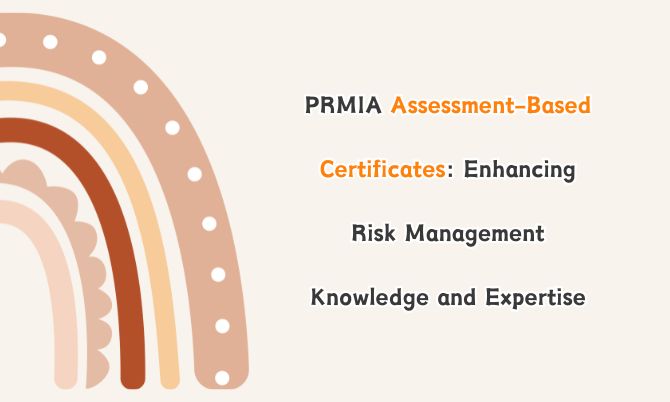Organizations across industries are seeking professionals who not only understand the risks that threaten their businesses but also have the skills to manage and mitigate them effectively. The Professional Risk Managers' International Association (PRMIA) offers a series of assessment-based certificates designed to help professionals gain deep expertise in various risk management areas. These certificates are a gateway for individuals seeking to advance their careers in risk management and are highly regarded by financial institutions and businesses globally.

The Associate PRM certificate is a foundational program ideal for professionals who regularly interact with risk management disciplines but need a solid understanding of its basic principles. This certificate covers a wide range of fundamental risk management concepts that are vital for managing risk effectively and maintaining a competitive edge in the market.
Key Topics Covered:
Risk Management & Corporate Risk Management: Understanding the core components of managing risk at both corporate and individual levels.
Risk & Return Theory: Exploring the trade-off between risk and return in financial decision-making.
Risk Governance and Financial Regulation: Gaining insights into regulatory frameworks and governance structures essential for managing risk.
Fintech & Risk Management: Examining the impact of financial technology on financial intermediation and risk management practices.
Market Risk & Stress Testing: Learning methods for evaluating market risk, asset-liability management, and scenario analysis.
Credit Risk Management: Insights into retail and commercial credit risk management practices and credit scoring methods.
Operational Risk: A deep dive into understanding operational risk in financial institutions.
This certificate is ideal for individuals who want to enhance their understanding of risk management principles and apply them effectively in a variety of financial settings.
The ORM Certificate is tailored for professionals seeking to deepen their knowledge of operational risk management (ORM) frameworks and measurement techniques. With an emphasis on practical application, the ORM Certificate is designed to prepare candidates for managing risk within financial institutions, ensuring they can produce valuable risk management information and implement robust risk assessment processes.
Key Topics Covered:
Operational Risk Frameworks: A comprehensive understanding of the structures and methodologies used to manage operational risk in financial institutions.
Risk Measurement Techniques: Learning basic modeling techniques for measuring operational risk.
Practical Risk Assessment: Gaining expertise in conducting meaningful risk assessments and producing actionable risk information.
This certificate is especially beneficial for professionals involved in developing or implementing operational risk frameworks, including risk managers, analysts, and compliance officers.
The CCRM Certificate focuses on the critical area of credit and counterparty risk management, which plays a pivotal role in the stability of financial institutions and the broader financial system. Professionals earning this certification will gain an in-depth understanding of credit risks and counterparty relationships, as well as the tools and techniques needed to manage these risks effectively.
Key Topics Covered:
Credit Risk Lifecycle: A detailed look at the products that create and drive credit risk, and how they are managed throughout their lifecycle.
Credit Derivatives & Securitization: Exploring advanced financial instruments like credit derivatives and securitization, and their role in credit risk management.
Modern Credit Risk Modeling: A focus on credit risk models using probability of default (PD) and loss given default (LGD), as well as value-at-risk (VaR) techniques.
Portfolio Management: Strategies for managing the risk of credit portfolios and mitigating counterparty risk.
CVA & DVA: Understanding and measuring credit valuation adjustment (CVA) and debt valuation adjustment (DVA), which are crucial for managing counterparty risk.
Standardized Approach for Counterparty Credit Risk (SA-CCR): Learning the regulatory framework for managing counterparty credit risk.
This certificate is particularly valuable for those working in credit risk management, financial controllers, operations, and compliance.
The MLARM Certificate focuses on the intersection of market risk, liquidity risk, and asset-liability management (ALM). While these topics may initially seem distinct, they are closely interrelated, especially in light of recent financial crises that highlighted the need for integrated risk management strategies. This certificate provides professionals with the tools to manage these risks effectively, ensuring they can respond to complex financial challenges.
Key Topics Covered:
Market Risk Management: Understanding the core principles of market risk governance, measurement, and management, including stress testing and VaR analysis.
Commodities Market Risk: A deep dive into market risk management within commodity markets.
Liquidity Risk Management: Identifying and managing liquidity risk within institutions, including the impact of interest rate fluctuations.
Asset-Liability Management (ALM): Gaining an understanding of how ALM can be used to manage interest rate risk and optimize a balance sheet.
Recent Crises & Lessons Learned: Examining how past financial crises have reshaped the understanding and management of market and liquidity risks.
The MLARM Certificate is ideal for professionals working in treasury, financial control, and market risk management.
The PRMIA Assessment-Based Certificates offer professionals the opportunity to gain specialized knowledge and skills that are highly valued in the risk management profession. Whether you're starting your career or seeking to advance your expertise in a specific area of risk management, these certifications provide a comprehensive framework for tackling the challenges financial institutions face in managing risk.
By earning a PRMIA certification, professionals demonstrate a commitment to maintaining high standards of risk management and are well-equipped to address the complexities of modern financial environments. Furthermore, these certifications enhance career prospects, making them an excellent investment for those looking to stay competitive in the ever-evolving field of risk management.